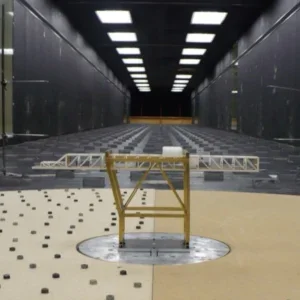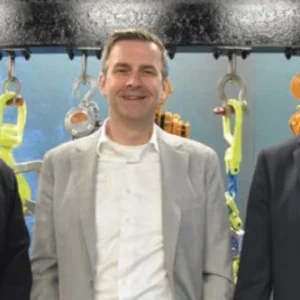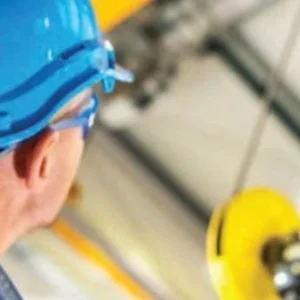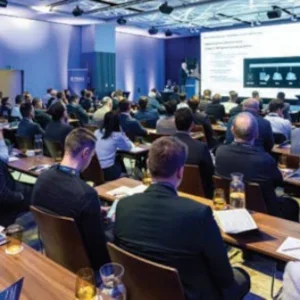Several rivers in the area, the Toxaway, Thompson, Horsepasture and Whitewater feed the dam forming Lake Jocassee which acts primarily for hydroelectric power generation and flood control. The dam and reservoir are part of the Keowee-Toxaway Hydroelectric Project, owned by Duke Energy, which provides power to a border area straddling both North and South Carolina.
Ace Industries is an overhead crane company founded in 1932 and has been through three generations of Arwood family ownership as a company, currently owned by the three Arwood siblings Josh, Cheryl Rossborough and Daniel, grandchildren of the original owner, Bud Arwood.
Stantec selected Ace Industries Modernization Unit Pelham, in Alabama, due to its experience and extensive engineering facilities and as a regular vendor of Duke’s Energy. Duke Energy initiated the multi-million-dollar project to ensure its systems met Federal Energy Regulatory Commissions (FERC) compliance and in the process upgrade and improve antiquated equipment.
The Ace team was on the job to work on the two side-by-side intake towers named Alpha and Bravo. These stations bring water down to the dam through intake tubes to turn generator turbines below, making power.
It partnered with hoist manufacturer IMS to build the hoists to Stantec’s specifications. The main IMS 120 ton hoist replaced a generic engineered hoist made in the 1940s, responsible for lifting and lowering the drain plug that blocks water coming in through the intake.
Another IMS polar crane with a 20 ton hoist sits on top of the unit to stop water flow completely for cases when it might be necessary to dry out a unit.
Both newly installed hoists are equipped with walkways with handrails and radio controls so they can be operated from ground level and custom-made stainless steel electrical panel cabinets. The 120 ton hoist has been upgraded with a gear box that allows for manual operation so that lowering and lifting of the plug can be achieved without the use of power, when needed.
The project took seven days and nights to complete, with Ace expert technicians joining the efforts from Louisiana, Alabama and North Caroline branches.
On completion of the project, Daniel Arwood, COO and co-owner, Ace Industries, sat down with Hoist to chat about the current market explaining that Covid-19 presented some hurdles to doing business at first but the company made some temporary adaptations to get through the restrictions, including improvements to its systems.
“The real challenge we face in the overhead crane industry is maintaining a skilled labor force with an aptitude for the unique mechanical abilities of this type of work. Recruiting and maintaining a qualified technical workforce is where we spend a lot of resources,” he said.
“Ace is unique in that as a family-owned small business local to the southern US, it scaled up very rapidly to a large, coast-to-coast operation. Moving with the times and keeping up with growth has had its challenges. However, we seem to navigate it and adapt successfully. We updated our branding to better express our mission and who we are, we have advanced our technology and put new systems in place to meet the challenges of our times in an industry that tends to have one foot stuck in the past.
“The challenges are a lot of larger brand, established companies are acquiring smaller mom and pop crane shops, making it harder for smaller crane companies to compete.”
Arwood added the best part of working in the crane industry is the people you meet and the connection to the industries and businesses you service.
“On a daily basis, we might get to see how paper is made in a papermill. We have a corporate customer who makes rocket ships and we get to see the fantastic work that goes into manufacturing these complicated devices. One of our technicians who regularly inspects cranes on a military base was able to see an active shooter drill in person. You never know what you will encounter, every day is different. We enjoy the bond we forge with our customers and develop relationships with some that last years. There’s a lot of trust involved in what we do and we do our best to secure that for our customers.”
In terms of feedback from clients Arwood explained that customers are looking for transparency in processes, pricing and data.
“We have made technological advancements in our software to provide analytical data that allows our customers to make more informed business decisions. They now have access to their own purchasing trends that reflect the impact of their current processes and pinpoint where inefficiencies can be improved. It also creates less dependency on us to access information pertinent to the maintenance and funding of their equipment and repairs,” he added.
“Customers are also asking us to think greener, increase cyber security, accumulate less waste and make more efficiency gains. Making sure customer data is protected is certainly top of mind in today’s climate and we take that very seriously. We had to quickly pivot during Covid-19 to prove to customers we were still flexible enough in our operations to serve them. Our teams are remote now but still able to work utilizing all tools regularly at our disposal, we are more agile and collaborate remotely more often, which also means less trucks traveling on the road to conserve fuel and to protect the environment.
“In the future, we will always need a skilled workforce, but the industry is headed towards automation and robotics. Margins are tight so efficiency will be key. We will be expanding and diversifying our product portfolio, updating internal software and customer management systems and stay ready to adapt to new ways of doing business.”






